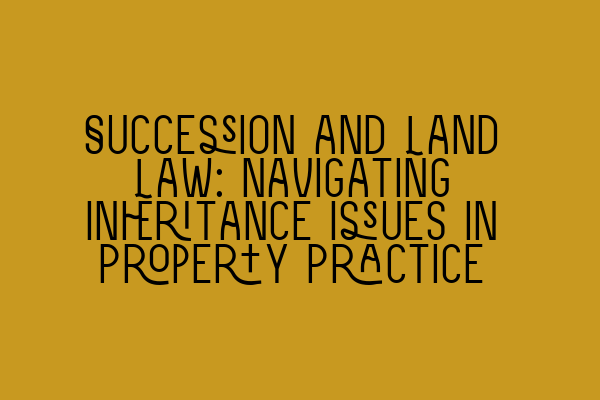Succession and Land Law: Navigating Inheritance Issues in Property Practice
In the field of property law, one area that frequently arises is succession and inheritance issues. As a solicitor practicing in property law, it is essential to possess a solid understanding of how land law intersects with succession law. This knowledge enables you to effectively navigate and advise your clients on matters related to inheritance and property ownership.
In this comprehensive guide, we will explore the key aspects of succession and land law, providing you with the necessary insights and expertise to excel in property practice. From understanding the legal framework to identifying potential problems and offering practical solutions, this article covers it all.
Understanding Succession and Land Law
Succession law dictates how property and assets are transferred when someone passes away. It outlines the rules regarding who inherits the deceased’s property, assets, and rights. Land law, on the other hand, governs the rights and interests related to land and real estate. It covers matters such as ownership, transfer, and use of land.
When it comes to succession and land law, several key concepts and principles are crucial to comprehend. One such concept is the idea of testamentary disposition. Testamentary disposition refers to the process of transferring property through a valid will or testament. Understanding the requirements for a legally valid will ensures that your clients’ intentions regarding their property and assets are properly executed.
Additionally, the concept of intestacy plays a significant role in succession and land law. Intestacy arises when a person dies without leaving a valid will. In such cases, the laws of intestacy determine who inherits the deceased’s property. Understanding the rules of intestacy is essential for advising clients who may be affected by intestate succession.
Potential Issues and Challenges
Succession and land law can be complex, and various issues and challenges may arise in practice. One common challenge is the existence of competing claims and disputes among potential heirs. Disputes over property ownership and inheritance rights can lead to litigation and can be emotionally draining for the individuals involved.
Another issue that property practitioners often encounter is the determination of property rights when multiple people have an interest in the same piece of land. Understanding the different types of property ownership, such as joint tenancy and tenancy in common, is crucial in resolving and clarifying ownership disputes.
Inheritance tax is yet another area of concern in property practice. Succession may trigger tax liabilities for the beneficiaries, and it is essential to have a strong grasp of inheritance tax laws to provide accurate advice to clients. Knowledge of available exemptions and reliefs can help mitigate the potentially significant tax burden for your clients.
Practical Solutions and Best Practices
Given the intricacies and challenges associated with succession and land law, it is important to adopt practical solutions and best practices to better serve your clients. Here are some key strategies that can help you navigate inheritance issues effectively:
- Stay Updated: Keep abreast of the latest developments in succession and land law. Regularly review case law, legislation, and guidelines to ensure you are providing the most accurate and up-to-date advice to your clients.
- Thorough Due Diligence: Conduct comprehensive due diligence on the property in question to identify any potential issues, such as competing claims or encumbrances. Thorough research and investigation can help prevent future disputes.
- Clear Communication: Clearly communicate the legal implications and potential risks to your clients. Help them understand their rights, obligations, and available options, enabling them to make informed decisions.
- Collaboration: Collaborate with other legal professionals, such as probate solicitors or tax experts, to provide comprehensive advice to your clients. Utilizing the expertise of other specialists ensures a well-rounded approach in addressing inheritance issues.
- Documentation: Emphasize the importance of accurate and legally valid documentation. Assist your clients in drafting and executing well-drafted wills and other legal instruments to ensure their wishes are upheld.
By implementing these practical solutions and following best practices, you can position yourself as a reliable and knowledgeable advisor in succession and land law matters, building trust and loyalty with your clients.
Conclusion
Succession and land law often intersect in property practice, and having a firm grasp of their intricacies is essential for property solicitors. By understanding the legal framework, identifying potential issues, and adopting practical solutions, you can effectively navigate inheritance issues and provide comprehensive advice to your clients.
At SQE Property Law & Land Law, our team of experts specializes in all aspects of succession and land law. Whether you need assistance with will drafting, probate matters, or resolving property disputes, we are here to help. Contact us today to learn more about our services and how we can assist you in your property practice.
Related Articles:
